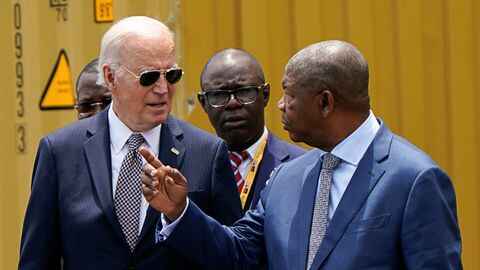US influence in Africa has decreased under President Biden’s leadership, despite his repeated promises to go “all in on Africa.”
In order to offset Chinese influence in the area and go forward with a plan to build a railway that would transport vital minerals from Zambia and the Congo to the West via Lobito, US President Joe Biden met with African leaders in the port of Lobito, Angola, on Wednesday.
The primary foreign participant in the DRC’s mining industry, which exports minerals deemed essential for batteries and other industrial components essential to the country’s move away from fossil fuels, is now China.
As part of the first phase of the Lobito endeavor, the United States has loaned $550 million to finance the renovation of an existing railway across Angola and its extension into the mining heartland of the Democratic Republic of the Congo.
The second phase, which would connect Lobito to Zambia through a new railway line, is still in the planning stages and is expected to begin construction in 2026, according to Washington, but no completion date has been set as of yet.
On the final day of Biden’s first and only journey to Africa as president, the presidents of Angola, Congo, and Zambia, together with the vice president of Tanzania, joined him for a meeting in Lobito.
In a White House message following their meeting, Biden and Felix Tshisekedi of Congo reaffirmed their commitment to fostering peace and investment so the central African country may capitalize on its enormous mineral wealth.
Along with other matters, Biden and his Zambian colleague Hakainde Hichilema met to talk about the Zambian portion of the Lobito project.
“This corridor is of vital importance to opening up our countries, to opening up our regions, the continent, and truly the global economy,” Hichilema stated. “This project is a huge opportunity for investment, for trade.”
“The presidents underscored their conviction,” according to a statement from the White House, “that countries should not be held back from investing in their development by the need to service unsustainably high debt, and together committed to continue advocating for reform.”
In June, Zambia became the first country to fully restructure its debt under the G20-led “Common Framework” framework when its foreign bondholders approved their portion of a $13.4 billion debt restructuring agreement.
The influence of China
Given Washington’s growing concerns over China’s hold on vital resources, such as Congo’s enormous quantities of copper and cobalt, the Lobito Atlantic Railway concession, given in 2022 to a group of Western businesses, has been portrayed as a victory against China.
The project’s second phase aims to connect Tanzania’s Indian Ocean port of Dar es Salaam with Zambia by expanding the Lobito corridor railway.
The second phase’s feasibility studies have been funded by the US, but others argue that it could give China a competing eastward route, which would undermine the project as a whole from Washington’s point of view.
Washington is anticipated to adopt a more assertive stance against China following Donald Trump’s inauguration as US president in January, and some officials have questioned whether US backing for the eastern route will endure.
Two individuals who were part of the former Trump administration from 2017 to 21 said that when Trump returns to the White House, he will probably support at least some of the Lobito project and continue to be close to Angola.
There are still unanswered questions regarding the specifics of the project’s second phase’s development and financing.
Portuguese construction company Mota-Engil, international commodities trader Trafigura, and railroad operator Vecturis are supporting the Lobito project. The completion date has not yet been set.
Without giving any additional information, a top US official stated on Tuesday that the Lobito project might be finished by the end of the decade.
The $550 million loan from the US Development Finance Corporation will be used to renovate the 1,300-kilometer (800-mile) rail system that connects Lobito and Congo.
This week, U.S. officials announced new funding of $600 million for the venture’s first phase through the Development Finance Corporation for projects ranging from solar to mining to telecommunications.
In Luanda on Tuesday, Biden met with his Angolan colleague Joao Lourenco and promised long-term US engagement with Africa on the continent’s conditions. Only weeks before his administration came to an end, Biden’s journey fulfilled his pledge to travel to Africa.
His repeated promises to be “all in on Africa” haven’t kept up with the decrease in US power in Africa during his presidency. In addition to losing a military facility in the Sahel, Washington has not done much to end China’s commercial hegemony over minerals deemed vital to national security.
Though it has recently shifted toward the West, Angola has traditionally maintained strong ties with China and Russia. During Biden’s visit on Tuesday, Lourenco stated that it wants to increase its cooperation with the US on military and security projects.






